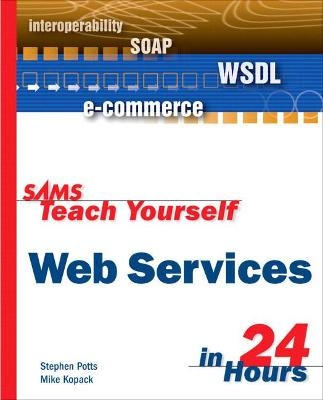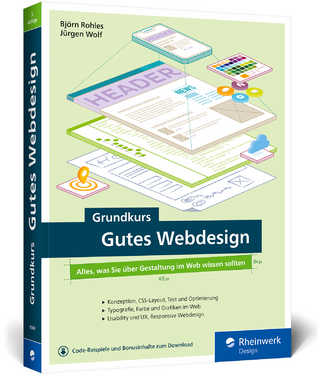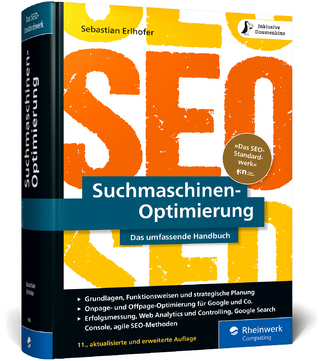
Sams Teach Yourself Web Services in 24 Hours
Sams Publishing (Verlag)
978-0-672-32515-1 (ISBN)
According to recent press reports, everyone is developing Web Services, but many are still in the exploratory phase - learning what's involved and how to achieve ROI. This book is designed to give a working introduction to Web Services to help decision-makers prepare for the implementation in their companies. It demystifies the topic by providing a beginning level explanation of what this technology is, what it means to businesses, where to apply it, and how to make it work.
Using numerous simple examples, the book explains the core concepts of Web Services: SOAP, UDDI, and WSDL, as well as tools and related concepts that will help create the "big picture" in readers' minds.
Stephen Potts is an independent consultant, author, and Java instructor in Atlanta, Georgia (United States). Stephen received his Computer Science degree in 1982 from Georgia Tech. He has worked in a number of disciplines during his 20-year career, with manufacturing being his deepest experience. His previous books include Java Unleashed and Java Primer Plus. He can be reached via email at stevepotts@mindspring.com. Mike Kopack is a graduate of the Georgia Institute of Technology, where he earned a bachelor of science degree in computer science. Mike is a Sun Certified Java Programmer with experience dating back to JDK 1.0.2. He specializes in server-side Web technologies. His prior work has involved building dynamic Web site content management systems for multibillion-dollar corporations. Currently, he works as a software engineer for ISX Corporation in Atlanta, Georgia. He can be reached via email at crazybiker_ga@yahoo.com.
(NOTE: Each chapter concludes with a Summary, Q&A, and Workshop.)
Introduction.
I. INTRODUCING WEB SERVICES.
Hour 1. Understanding Web Services.
Understanding What Web Services Are. The Great Promise of Web Services. The Key Components. Tools and Vendors. Who Manages the Web Services Specifications.
Hour 2. Advantages of Web Services.
Legacy Systems. Lower Operational Costs. Lower Software Development Cost. Faster System Development. Better Interfaces with Customers. Better Integration with External Business Partners. New Revenue Opportunities. Completely New Business Models.
Hour 3. Disadvantages and Pitfalls of Web Services.
Pitfalls of Web Services. Performance Issues. Lack of Standards. Newness of Web Service Technology. Staffing Issues.
Hour 4. Comparing Web Services to Other Technologies.
Stub/Skeleton Based Architectures. HTTP Transactional-based Architectures. Screen Scrapers.
Hour 5. Typical Web Services Designs.
Designing the Conglomerate Reporting System. Redesigning the Shop Floor System. Designing an E-Commerce Site. Uniqueness of Web Services Designs.
II. WORKING WITH WEB SERVICES.
Hour 6. The Web Services Architecture.
The Goal of the Web Services Architecture. The SOA. The Major Components of the Architecture. Understanding Interactions Between Components.
Hour 7. Understanding XML.
Understanding Why We Need XML. The Components of XML. The XML Grammar Rules. Understanding Namespaces. Understanding the XML Schema.
Hour 8. Understanding How Web Services Communicate.
TCP/IP and How the Internet Works. HTTP. Message Queues. SMTP. FTP. Jabber.
Hour 9. Exchanging Messages with SOAP.
What SOAP Is. Why SOAP Is Different. The SOAP Grammar. SOAP Data Types.
Hour 10. Describing a Web Service with the Web Services Description Language (WSDL).
The WSDL Document.
Hour 11. Advertising a Web Service.
The Need to Advertise a Web Service. The Purpose of a Registry. Universal Description, Discovery, and Integration (UDDI). Types of Discovery.
Hour 12. Sending Attachments with Web Services.
The Problem with Binary Data. Using Base64 Encoding. Multipurpose Internet Mail Extensions. Direct Internet Message Encapsulation. Understanding the New SOAP 1.2 Attachment Feature.
III. BUILDING WEB SERVICES.
Hour 13. Creating Web Services with Apache Axis.
Understanding Apache Axis. The Axis Architecture. Creating Web Services with Axis. Creating a Client for an Axis Web Service.
Hour 14. Creating Web Services with Java.
Whats Included in the Java Web Services Developer Pack. Building a Simple Web Service. Deploying and Registering the Service. Creating a Client to Attach to the Service.
Hour 15. Creating Web Services with .NET.
Understanding the .NET Architecture. Building a Simple Web Service. Creating Your Own Web Service.
Hour 16. Creating .NET Web Service Clients.
Exchanging Complex Data. Discovering a Web Service. Writing a Client for the Discovered Service.
Hour 17. Creating Web Services with BEA WebLogic Workshop.
The Architecture of the WebLogic Workshop Product. Creating a Web Service with WebLogic Workshop. Creating Web Services Clients with WebLogic Workshop. Creating a Conversation That Maintains State.
Hour 18. Creating Web Services with IBM WebSphere.
IBM and Web Services. WebSphere Application Developer. Developing a Web Service with WSAD.
Hour 19. Creating Web Services with Other Toolkits.
The Mind Electric GLUE. PocketSOAP. SOAP: Lite.
Hour 20. Comparing the Different Web Services Tools.
The Importance of Choosing the Best Web Services Tool. The Products Chosen for Evaluation. Establishing the Evaluation Criteria.
IV. ADVANCED TOPICS.
Hour 21. Web Services Interoperability.
Making Web Services Interoperate. The Limitations of Interoperability. Meeting the Challenge.
Hour 22. Web Service Security.
Defining Web Services Security. The Webs Security Infrastructure. The Secure Sockets Layer. The Proposed Security Specifications.
Hour 23. Web Services in the Real World.
Case Studies of Real Web Service Solutions. Web Services Directories on the Web.
Hour 24. The Future of Web Services.
Nontraditional Uses. A New Version UDDI. Understanding W3Cs Web Services Architecture.
V. APPENDIXES.
Appendix A. Installing Apache Tomcat and Axis.
Tomcat. Axis.
Appendix B. Installing the Java Web Services Developer Pack.
Appendix C. Installing and Configuring Other Toolkits.
The Mind Electric GLUE 3.0. PocketSOAP Installation and Configuration. SOAP::Lite Installation and Configuration.
Index.
| Erscheint lt. Verlag | 15.5.2003 |
|---|---|
| Reihe/Serie | Sams Teach Yourself |
| Verlagsort | Indianapolis |
| Sprache | englisch |
| Maße | 190 x 232 mm |
| Gewicht | 768 g |
| Themenwelt | Informatik ► Web / Internet ► Web Design / Usability |
| ISBN-10 | 0-672-32515-2 / 0672325152 |
| ISBN-13 | 978-0-672-32515-1 / 9780672325151 |
| Zustand | Neuware |
| Informationen gemäß Produktsicherheitsverordnung (GPSR) | |
| Haben Sie eine Frage zum Produkt? |
aus dem Bereich


